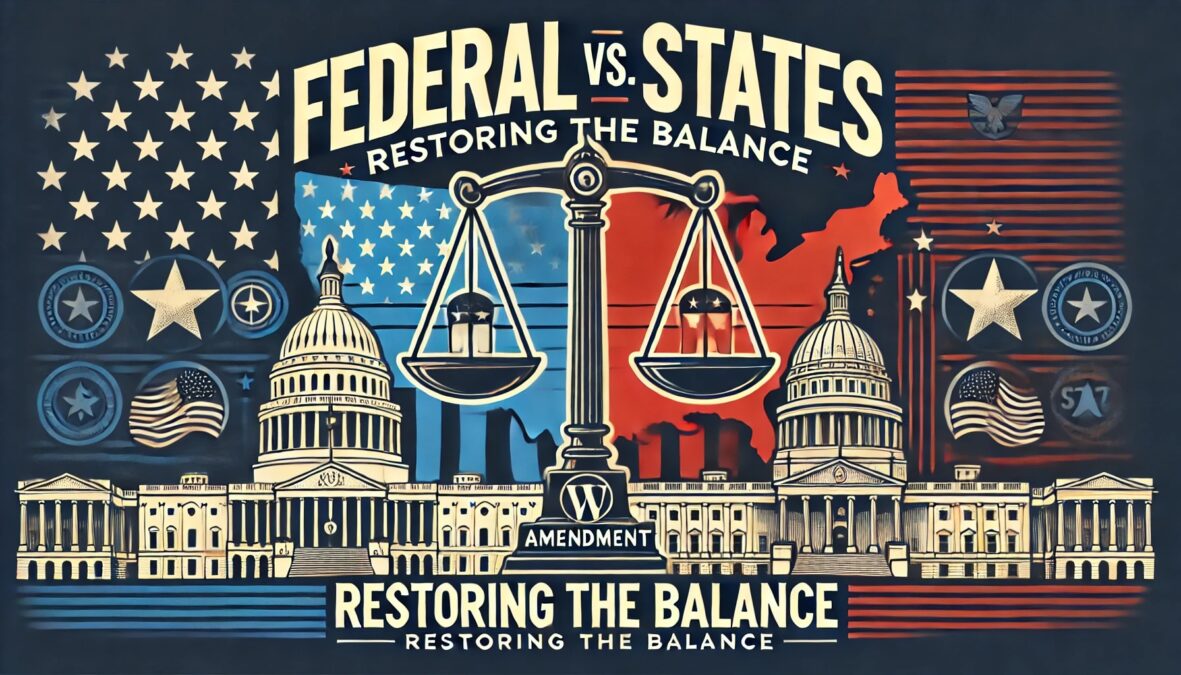If you’ve been following my blog, you’ve already journeyed with me through the question of whether the three branches of the federal government were designed to be coequal (spoiler: they weren’t) and my exploration of the Fourteenth Amendment’s implications for birthright citizenship (spoiler: justice and compassion are inseparable). Now let’s turn our gaze to a lesser-discussed imbalance—the relationship between the federal government and the states.
As a federated republic, our Constitution intentionally divides power not only between the three branches of the federal government but also between the federal government and the states. The original design ensured that both levels of government would hold each other accountable, preserving liberty by preventing the concentration of power. Unfortunately, that balance has shifted dramatically, and much of it stems from the ratification of the 17th Amendment in 1913.
The Founders’ Intent for the Senate
When the framers gathered in Philadelphia in 1787, they envisioned the Senate as the voice of the states in federal governance. Article I, Section 3 of the Constitution originally provided that state legislatures would appoint Senators. Why? Because the states, as sovereign entities, needed a direct channel to influence federal policy. This ensured:
- State Sovereignty: States had a seat at the table to safeguard their interests.
- Federalism: The Senate served as a counterbalance to the House of Representatives, which directly represented the people.
- Deliberation Over Populism: By insulating the Senate from the passions of direct democracy, the framers aimed for a more thoughtful and stable legislative process.
The system worked… for a while. But by the late 19th century, corruption and inefficiency plagued the process. State legislatures deadlocked over appointments, leaving Senate seats vacant, and some elections were marred by outright bribery. Enter the Progressive Era and the push for reform, culminating in the ratification of the 17th Amendment, which established direct election of Senators by the people.
How the 17th Amendment Changed Everything
The 17th Amendment democratized the Senate, but it also fundamentally altered the balance of power. By removing state legislatures from the equation, it:
- Weakened State Sovereignty: States lost their direct influence in federal policy-making.
- Nationalized Senate Elections: Instead of focusing on state-specific issues, Senate campaigns became dominated by national party platforms and out-of-state funding.
- Centralized Federal Power: With the Senate no longer accountable to state governments, federal authority expanded at the expense of the states.
Today, the federal government’s reach extends into areas traditionally reserved for states, such as education, healthcare, and infrastructure. Federal mandates often come with strings attached, leaving states to either comply or lose critical funding. This shift undermines the Constitution’s federalist design and diminishes the role of states as coequal partners in governance.
Enumerated Powers and the Balance of Power
The Constitution grants the federal government specific enumerated powers under Article I, Section 8. These include the power to:
- Levy taxes.
- Regulate commerce between states and with foreign nations.
- Coin money and regulate its value.
- Declare war and maintain armed forces.
- Establish post offices and roads.
The framers intended these powers to be clear and limited, leaving all other powers to the states or the people under the Tenth Amendment. This division was designed to ensure that the federal government focused on national issues while states retained authority over local matters.
However, over time, the federal government has expanded its reach far beyond these enumerated powers, often invoking the Commerce Clause and the Necessary and Proper Clause as justifications.
Examples of Federal Overreach
- Education: The creation of the Department of Education in 1979 and subsequent federal initiatives like No Child Left Behind have centralized control over education, traditionally a state responsibility.
- Healthcare: The Affordable Care Act (ACA) imposed federal standards and mandates on states, including Medicaid expansion, which some states resisted.
- Environmental Regulations: Federal agencies, such as the Environmental Protection Agency (EPA), often issue sweeping regulations that override state preferences, such as restrictions on energy production.
These examples highlight how the federal government has used its authority to encroach on areas originally reserved for states. Such overreach disrupts the balance of power and undermines state sovereignty.
A Biblical Worldview on Governance
From a biblical perspective, governance is ultimately accountable to God. Romans 13:1-4 reminds us that all governing authorities are established by God and are meant to be His servants for good. This divine mandate calls for a system of governance that reflects justice, humility, and accountability (Micah 6:8).
The principle of subsidiarity aligns closely with the Constitution’s federalist design. Subsidiarity teaches that matters ought to be handled by the smallest, most local competent authority. This ensures that power is exercised responsibly and does not lead to overreach, reflecting the stewardship entrusted to human governments.
The Bible also warns against the dangers of centralized power. In 1 Samuel 8, the Israelites demand a king, rejecting God’s intended system of decentralized governance through judges. Samuel warns them of the king’s potential for tyranny and excessive control, a cautionary tale for the modern trend of consolidating power at the federal level.
Moreover, Jesus’ teaching in Mark 12:17, “Render to Caesar the things that are Caesar’s, and to God the things that are God’s,” underscores the importance of limited government. It suggests that human governments have a defined role and should not usurp authority that belongs to other spheres, such as the family, the church, or individual conscience.
Why Fixing This Requires a Constitutional Amendment
As I discussed in my post on birthright citizenship, executive fiat isn’t the solution to constitutional issues. Sure, it might feel satisfying to see a decisive stroke of the pen, but lasting change requires adherence to the constitutional amendment process. This is no exception. Fixing the balance of power between the federal government and the states demands a return to the original intent of the Constitution, and that means amending it.
Could we repeal the 17th Amendment? In theory, yes. But let’s be honest—the idea of asking Congress to voluntarily relinquish power is like asking a toddler to share their favorite toy. Still, if we’re serious about restoring federalism, this is a conversation we need to have.
States Must Reclaim Their Rights
Another critical factor in this imbalance is the failure of states to stand up for their rights. Too often, state governments have acquiesced to federal mandates rather than asserting their sovereignty.
- Some states, for example, have challenged federal overreach through lawsuits, as seen in cases related to immigration and healthcare. However, these efforts are inconsistent and often reactive.
- To restore balance, states must proactively assert their authority, demand accountability, and push back against unconstitutional federal actions.
As James Madison wrote in Federalist No. 45, “The powers delegated by the proposed Constitution to the federal government are few and defined. Those which are to remain in the State governments are numerous and indefinite.” It’s time for states to remember and reclaim their rightful place in this partnership.
Back to the Future: The Case for Original Intent
The Constitution was never meant to be a static document, but its core principles remain timeless. The framers’ vision for a federated republic recognizes that government works best when power is distributed, not concentrated. To fix what’s broken, we must:
- Reaffirm Federalism: Advocate for policies that empower states to reclaim their role as laboratories of democracy.
- Promote Accountability: Ensure that Senators once again serve as stewards of their states, not pawns of national political parties.
- Educate the Public: Foster a deeper understanding of the Constitution’s original design and the importance of maintaining balance between federal and state powers.
- Reflect Biblical Principles: Encourage leaders and citizens to embrace governance that reflects justice, humility, and stewardship, rooted in accountability to God.
A Little Humor to Wrap Up
Restoring the balance between the federal government and the states might feel like an impossible task, but as my mom used to say, “Nothing worth doing is ever easy.” (She also said, “Don’t put that in your mouth; you don’t know where it’s been,” which, come to think of it, is good advice for federal overreach too.)
If we want to fix our government, we must have the courage to revisit ideas that made it work in the first place. The 17th Amendment was well-intentioned, but its unintended consequences have tipped the scales too far. It’s time to have an honest conversation about whether direct election of Senators serves the best interests of our republic.
References
- U.S. Constitution, Article I, Section 3.
- The 17th Amendment, ratified April 8, 1913.
- Reighley, Chris. Were the Three Branches of Government Meant to Be Equal? chrisreighley.com.
- Reighley, Chris. The Fourteenth Amendment and Birthright Citizenship: A Call for Justice and Compassion. chrisreighley.com.
- Federalist No. 62, James Madison.
- Federalist No. 45, James Madison.
- The Holy Bible, Romans 13:1-4, Micah 6:8, 1 Samuel 8, Mark 12:17.
Let’s keep the conversation going. What do you think about the 17th Amendment? Is it time to restore the balance, or is there a better way to ensure federalism in the 21st century? Share your thoughts below!






